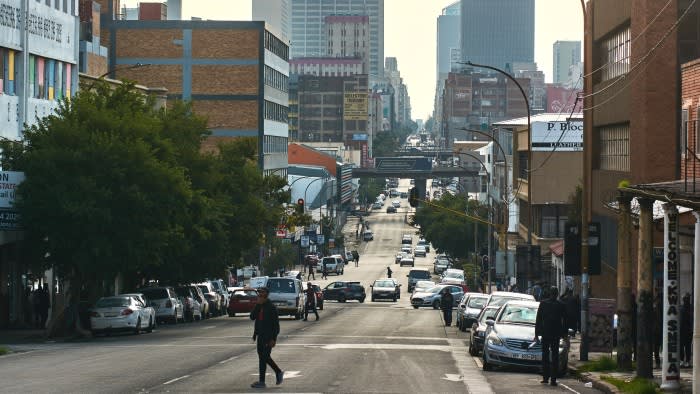At the same time, the Biden administration is struggling to fulfill its commitments to other countries to provide supplies to combat the virus, including oxygen for the sickest patients. The U.S. has only been able to fill a fraction of the requests it has received for the gas and the materials needed to administer it, recently shipping out 1,500 oxygen cylinders and other components to India and 1,000 cylinders to Nepal. Nepal had originally requested close to 20,000 cylinders, a senior U.S. official with knowledge of the matter said.
The struggle to procure lifesaving medical supplies underscores the extent to which the U.S. is unprepared for another surge in Covid-19 infections. It also underlines the difficulties facing the Biden administration, and governments and health care providers worldwide, in meeting demand for key medical products in the second year of the pandemic — amid the spread of the highly transmissible Delta variant.
“Because we did not have the kind of centralized intelligence to identify, test for and execute rapid containment, the U.S. missed our opportunity to contain the virus. It was very difficult to quantify what the healthcare systems needed to do to be prepared,” said Charity Dean, California’s former assistant director of the Department of Public Health. “Without a technology revolution … the U.S. will not be prepared for another pandemic. Right now, the system cannot move as fast as the pathogen does.”
A spokesperson for the Department of Health and Human Services said “the SNS is working to balance its stockpiling requirements with the ongoing needs of healthcare facilities.” The Federal Emergency Management Agency is also helping HHS build up the U.S. stockpile.
Two senior officials working on the federal government’s stockpiling efforts said part of the reason the U.S. has not met its stockpile targets for items such as gloves is because the Covid-19 case count has dropped dramatically, and hospitals, public health officials and other health care providers are not submitting requests for help. But the stockpile is designed to help the nation prepare for unpredictable emergencies, and the government, which sets the inventory targets, has not lowered them in the face of the weakening demand.
The scramble to obtain medical supplies in the face of a widespread health emergency has sparked conversations on Capitol Hill about ways to better fund and organize the federal stockpile.
U.S. Rep. Brad Schneider (D-Ill.) and David McKinley (R-W.Va.) introduced a bill in February that aims to address personal protective equipment and testing kit shortages. Earlier this month, Sen. Bill Cassidy (R-La.), Sen. Maggie Hassan (D-N.H.) and Rep. Elissa Slotkin (D-Mich.) introduced legislation with the goal of reducing dependency on foreign materials and boosting domestic manufacturing of medical supplies.
“The medical supply chain is a very complex global system of which the Strategic National Stockpile is a tiny little part,” said Tara O’Toole, a former homeland security official in the Obama administration. “The stockpile cannot possibly in a real world universe keep enough stuff on hand to be able to supply the country’s needs for all hazards.”
The federal government created the stockpile, originally the National Pharmaceutical Stockpile, in 1999 to counter potential biological, disease and chemical threats to civilian populations. It was eventually renamed the Strategic National Stockpile in 2003, and the Department of Defense was given a role in its management alongside HHS. The stockpile was designed as a stopgap that would allow the federal government to surge supplies to specific areas experiencing disasters or threats, supplementing local procurement efforts. It was not meant to be the sole source for private and public institutions to obtain medical supplies in emergency settings.
Hospitals, public health departments and other health care facilities are supposed to maintain their own stocks of masks, gowns, drugs and ventilators. But during the first months of the Covid-19 pandemic in 2020, they ran out of those basic supplies. The overwhelming number of Covid-19 patients forced both private and public institutions to search for personal protective equipment and therapeutics on the open market.
“The supply chain conversations — I was having those in January, but we were flying blind,” Dean said. “The preparations we should have made in January and February weren’t made until early to mid March. By that point, the U.S. was behind the curve in accessing critical supply chains.”
The federal government activated the stockpile to help fill the states’ gaps in Covid-19 medical supplies and materials. But it did not have enough supply to meet the strong demand, and federal officials faced obstacles in quickly obtaining more materials on the open market. There were not enough masks, gowns, ventilators and drugs to go around. The companies who manufactured things like gowns and N95 masks did not have the manufacturing capacity to quickly produce the amount of product needed.
A year and a half into the pandemic, the U.S. still does not have a good way to quickly scale production of drugs and medical supplies needed to help supplement the strategic national stockpile, in part because manufacturers operate on just-in-time principals. Those standards are supposed to minimize inventory and maximize efficiency, but struggle to account for swings in demand.
“Everybody — shippers, hospitals, pharmacy chains — no one wants to hold inventory. Who is going to pay for those expensive medicines sitting there month after month?” O’Toole said. “This is why hospital stockpiles have dwindled.”
The federal government is beginning to work with the private sector to ensure manufacturers have the ability to scale production quickly during large-scale disease outbreaks.
The Biomedical Advanced Research and Development Authority (BARDA) is working with its parent, HHS, to find companies willing to alter their standard manufacturing practices to scale up production of therapeutics and other medical supplies to better prepare for the next pandemic. But expanding manufacturing capacity in the U.S. is not easy, one former Trump administration official who worked with BARDA told POLITICO. It will take years to build facilities, manufacturing lines and hire staff to oversee production, the former official said.
Because 57 percent of adult Americans are fully vaccinated and Covid-19 case rates have fallen drastically in recent months, the federal government believes it currently has enough supply in the Strategic National Stockpile to handle small state requests and to handle a moderate increase in cases due to the Delta variant. But, officials said, if another nationwide surge occurs, the stockpile will only be able to supplement state supplies, not fill the caches completely.
But the Biden administration is also trying to help countries across the globe battling sharp spikes in Covid-19 cases and deaths, and it is struggling to procure and ship supplies overseas. Beyond calls for vaccines, the administration has received urgent requests for oxygen and oxygen components such as cylinders from countries in Africa, the Middle East and Asia.
The U.S. obligated about $18 million in November 2020 to bolster supplies of medical oxygen across 11 countries. But oxygen concentrators — machines that filter oxygen from the air — procured through this funding have only been delivered to Honduras, Guatemala and Haiti. Beginning this month, the U.S. Agency for International Development has provided emergency medical oxygen supplies to Nepal, Bangladesh, India, Maldives, Pakistan, and Sri Lanka. Dozens of other countries are seeking the same assistance from the U.S.
“Under normal circumstances, even before the pandemic, oxygen access was a challenge … for a lot of countries at the time. There just hasn’t been enough attention and investment on the issue,” said Robert Matiru, a director at Unitaid, a health initiative that works with the World Health Organization. “Many health systems from multiple countries have been challenged not by the fact that they didn’t have a baseline capacity but then the surge capacity just overwhelmed them. The demand for oxygen is almost double, triple, quadruple what is normally required.”















